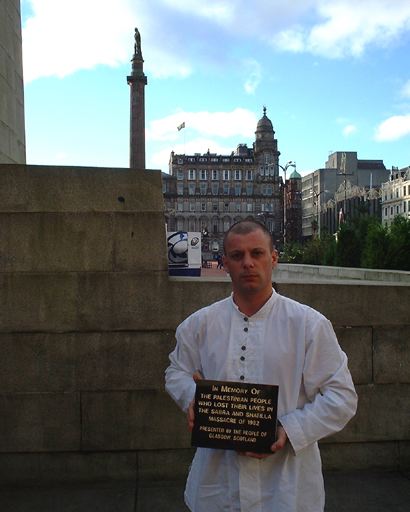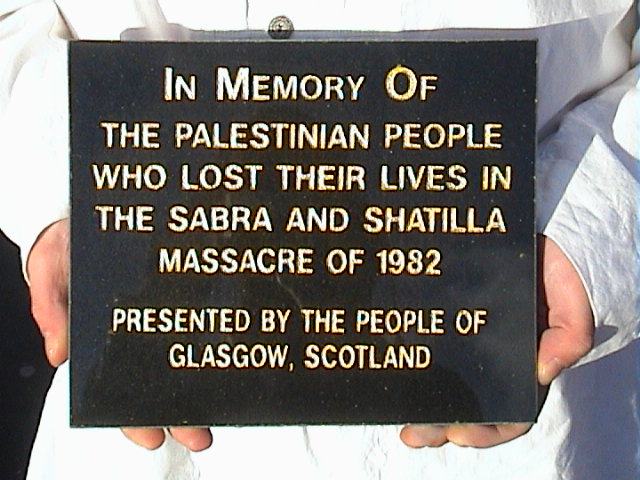scottish activist visits Beirut to commemorate Sabra and Chatila 20th anniversar
mick | 19.10.2002 23:33

scottish activist visits Beirut to commemorate Sabra and Chatila 20th anniversar

scottish activist visits Beirut to commemorate Sabra and Chatila 20th anniversar
Here below is Robert Fisk's emotional account of his vist to the camp years after the deed, and his visceral shock again:
THE LEGACY OF ARIEL SHARON
By Robert Fisk
The Independent, February 6th, 2001
This is a place of filth and blood which will forever be associated with Ariel Sharon. In Israel today, he may well be elected prime minister. Then he will be master of the most powerful nation in the Middle East; he will travel to America, he will visit the White House and shake hands with President George W Bush. But for everyone who stood in the Sabra and Chatila refugee camps in Beirut on 18 September 1982, his name is synonymous with butchery; with bloated corpses and disembowelled women and dead babies, with rape and pillage and murder...
Even when I walk these fetid streets today, more than 18 years after what was – by Israel's own definition of that much-misused phrase – the worst single act of terrorism in modern Middle East history, the ghosts haunt me still. Over there, on the side of the road leading to the Sabra mosque, lay Mr Nouri, 90 years old, grey-bearded, in pyjamas with a small woollen hat still on his head and a stick by his side. I found him on a pile of garbage, on his back, fly-encrusted eyes staring at the blazing sun. Just up the lane, I came across two women sitting upright with their brains blown out, next to a cooking pot and a dead horse. One of the women appeared to have had her stomach slit open. A few metres away, I discovered the first babies, already black with decomposition, scattered across the road like rubbish.
Yes, those of us who got into Sabra and Chatila before the murderers left have our memories. The flies racing between the reeking bodies and our faces, between dried blood and reporter's notebook, the hands of watches still ticking on dead wrists. I clambered up a rampart of earth – an abandoned bulldozer stood guiltily nearby – only to find, once I was atop the mound, that it swayed beneath me. And I looked down to find faces, elbows, mouths, a woman's legs protruding through the soil. I had to hold on to these body parts to climb down the other side. Then there was the pretty girl, her head surrounded by a halo of clothes pegs, her blood still running from a hole in her back. We had burst into the yard of her home, desperate to avoid the Israeli-uniformed militiamen who still roamed the camp; coming in by back door, we had found her body as the murderers left by the front door.
And as I walked through the carnage on 18 September – the last day of the three-day massacre – with Loren Jenkins of The Washington Post, a fierce, tough, Colorado reporter, I remember how he stopped in shock and disgust. And then, with as much energy as his lungs could summon in the sweet, foul air, he shouted, "SHARON!" so loudly that the name echoed off the crumpled walls above the bodies. "He's responsible for this fucking mess," Jenkins roared. And that, just over four months later – in more diplomatic words and in a report in which the murderers were called "soldiers" – was what the Israeli commission of enquiry decided. Sharon, who was minister of defence, bore "personal responsibility", the Kahan commission stated, and recommended his removal from office. Sharon resigned.
And so today, in this fetid, awful place, where Lebanese Muslim militiamen were – three years later – to kill hundreds more Palestinians in a war which produced no official inquiries, where scarcely 20 per cent of the survivors still live, where brown mud and rubbish now covers the mass grave of 600 of the 1982 victims, the Palestinians wait to see if their tormentor will hold the highest office in the state of Israel.
"Ariel Sharon was responsible," a well-dressed young man shouted at us from an apartment balcony yesterday morning. And who could disagree? Israel had invaded Lebanon on 6 June 1982 with a plan – known to Sharon but not vouchsafed to his Likud prime minister, Menachem Begin – to advance all the way to Beirut and surround Yasser Arafat's Palestine Liberation Organisation guerrillas in the Lebanese capital. Officially named "Operation Peace for Galilee" (the real Israeli military codename was "Snowball"), the invasion was supposedly a response to PLO rocket attacks across the Israeli border.
But the rocket attacks had followed a series of Israeli air-raids on Lebanon which had ended a UN-brokered ceasefire and which were supposedly in "retaliation" for the attempted murder of the Israeli ambassador to London – though his would-be killers came from the Abu Nidal group which had nothing to do with the PLO and hated Arafat. But Sharon had anyway received an earlier American "green light" for his operation from Alexander Haig in the spring of 1982. After two months and almost 17,000 deaths, most of them civilians – the majority killed by Israeli gunfire and air attack – the PLO withdrew from Beirut under international protection, leaving their unarmed families behind. At which point Sharon announced that 2,000 "terrorists" remained in the Sabra and Chatila camps. These mythical "terrorists" prompted a small advance by Israeli tanks – contrary to an agreement with Washington – towards the Palestinian camps. A French UN officer who tried to photograph the advance was shot dead by an "unknown" sniper. Sharon repeated his extraordinary claim that "terrorists" remained in the camps. And it was then that the Christian Lebanese president-elect, Bashir Gemayel – the leader of the Phalange militia which had already murdered thousands of surrendering Palestinians in the Tel el-Zaatar camp in 1976 – was assassinated.
Sharon paid his condolences to Gemayel's father, Pierre. He must have known the old man's history. Pierre Gemayel had founded his party after being inspired by the Olympics in Nazi Germany in 1936 ("I liked their idea of order," he once confided to me). Not for nothing did Israel's militia allies use the fascist "Phalange" as their name. As the Christians prepared to bury their hero, Sharon – again contrary to assurances he had given the Americans – ordered the Israeli army into west Beirut to "restore order". The Israelis then asked the Christian Phalange – armed and uniformed by Israel and allied to Israel since 1976 – to enter the Israeli-surrounded camps to "liquidate" the "terrorists". Which is why, on Thursday 16 September, guided by signposts which the Israelis had laid across a Beirut airport runway, the Christian gunmen walked through the southern entrance of Chatila, some of them drunk, a number on drugs – all under the eyes of the Israelis – and embarked on a war crime.
Today, much scarred by later wars, the lanes of Chatila still follow the same paths I walked down 18 years ago. There are always survivors who have never told their stories to us before. Yesterday I wandered up an alleyway – rippling with water pipes and running with rain and sewage – to find a middle-aged woman buying tomatoes from a stall. I was 30 metres from the road where I discovered Mr Nouri's body almost two decades ago. She took me to her family home and introduced me to her daughter, Nadia Salameh. Nadia was only 12 when Ariel Sharon's soldiers watched the Phalangist militia slaughter their way through the camps.
"At the end of this alleyway outside our home, we were all shocked by what we saw," she told me, her voice slowly rising with the memory of horror. "I saw corpses there, seven deep, some decapitated, others with their throats slit. One of our neighbours was lying there, Um Ahmed Saad, and her body had grown big with the heat. Her hands had been chopped off at the wrists. She used to wear a lot of bracelets, a lot of gold. The Phalange obviously wanted the gold."
Each house I enter contains the faded photographs of young men killed in the war, some by Israel's allies, others by Shia Muslim gunmen in the later 1985 camps war. But their memories have not faded. Old Abdullah – he is 78 and pleaded with us not to use his family name – talks without looking at me, eyes staring at the wall. The ghosts are returning again. "The Phalange were led by Elie Hobeika," he said, "but who sent them into the camps? The Israelis. And who was the defence minister? Sharon. They put their tanks round the camp. I was part of a delegation that tried to negotiate with them. We carried a white flag. When we got near, there was a man's voice on a loudspeaker telling us to have our identity cards ready. But I didn't have my ID. So I went back home. And it turned out the loudspeaker was being used by a Phalangist. And they murdered all the men in the delegation. I was the only one to survive."
There was no doubt that the Israelis could see what the Lebanese Christian Phalange were doing. The Kahan commission was later to quote Lieutenant Avi Grabovski, deputy commander of an Israeli tank unit that was helping to encircle the camp: he watched the murder of five women and children and wanted to protest, but his battalion commander had replied to another soldier who complained that "we know, it's not to our liking, and don't interfere". Up to 2,000 Palestinians were murdered – two mass graves remain unexhumed in Beirut – and Sharon's reputation, already besmirched by the much earlier slaughter of more than 50 Palestinian civilians by his Commando Unit 101, seemed as buried as the Palestinian victims.
But like the garbage that has collected over the only known mass grave, the historical narrative – save for that of the survivors – has become overgrown. History moves on. Arafat recognised Israel and found himself trapped by an agreement that would give him neither a real "Palestine" nor secure the return of the refugees – including those in Sabra and Chatila – to what is now Israel. And the new leader of Israel is, within hours, likely to be the man who allowed the killers into the Beirut camps more than 18 years ago.
With power, of course, comes respect. CNN now calls Sharon "a barrel-framed veteran general who has built a reputation for flattening obstacles and reshaping Israel's landscape", while the BBC World Service on Sunday managed to avoid the fateful words Sabra and Chatila by referring only to his "chequered military career". As for Nadia Salameh, "Sharon's role here shows what he is capable of. If Sharon is elected, the whole peace process falls by the wayside because he doesn't want peace." It's a relief to recall that up to a million Israelis demonstrated their moral integrity in 1982 by protesting in Tel Aviv against the massacre. And equally chilling to reflect that some of those one million – if the polls are accurate – may well be voting for Mr Sharon today.
© The Independent 2001
mick